Healthcare Literature Review: PICOT Statement and Hand Hygiene
VerifiedAdded on 2022/12/19
|5
|1074
|1
Report
AI Summary
This report presents a literature review based on a PICOT statement that investigates the effect of handwashing techniques on hospitalized patients in reducing hospital-acquired infections. The study examines the problem of nosocomial infections, which lead to increased healthcare costs and patient morbidity, and explores the effectiveness of hand hygiene practices in healthcare settings. It analyzes research on handwashing protocols, bacterial contamination, and adherence rates among healthcare staff. The review synthesizes findings from various studies, highlighting the impact of hand hygiene on reducing infection rates and improving overall hygiene. The conclusion emphasizes the importance of handwashing practices in controlling nosocomial infections and suggests the need for better management of adherence and compliance among healthcare workers to reduce hospital-acquired infections and healthcare costs.
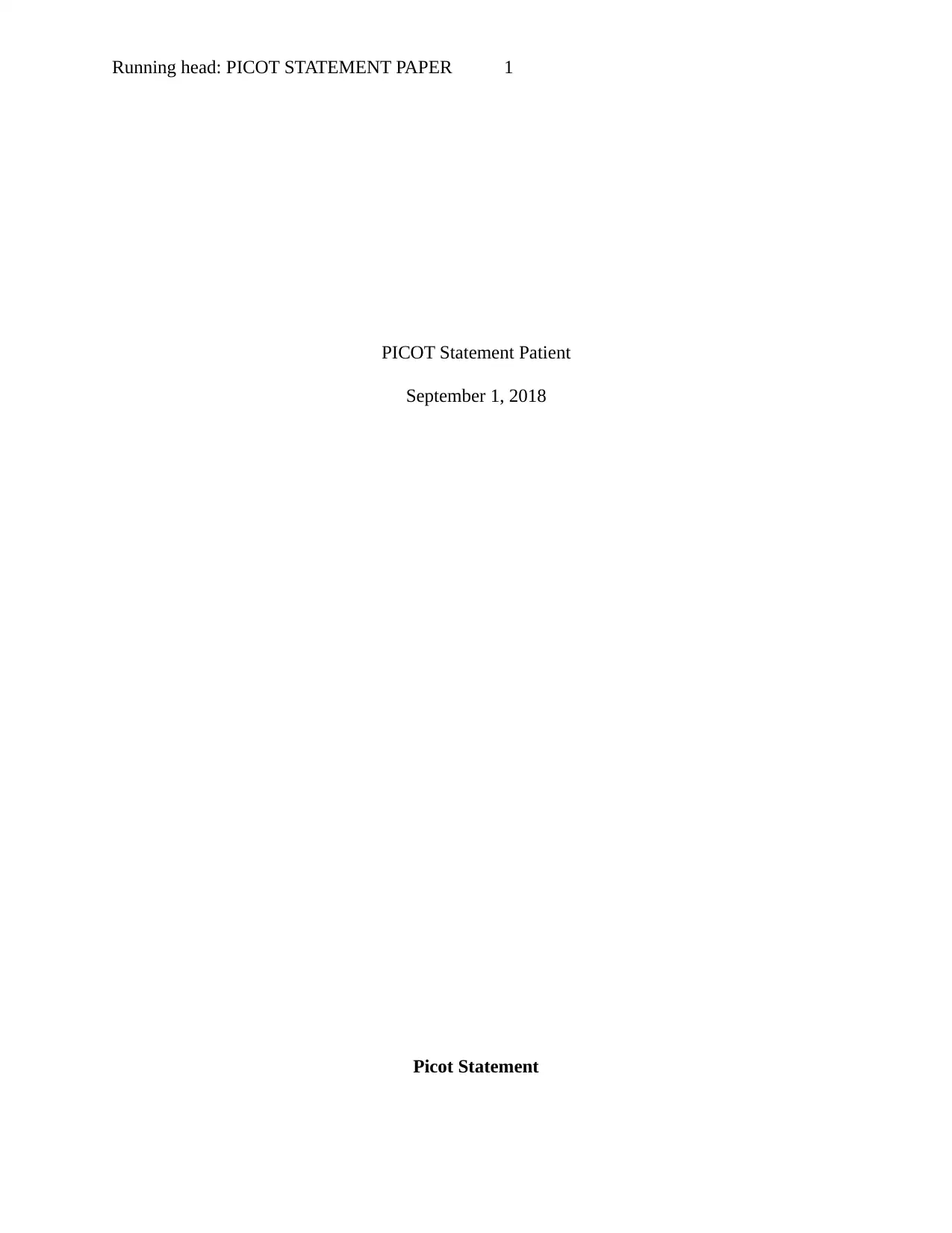
Running head: PICOT STATEMENT PAPER 1
PICOT Statement Patient
September 1, 2018
Picot Statement
PICOT Statement Patient
September 1, 2018
Picot Statement
Paraphrase This Document
Need a fresh take? Get an instant paraphrase of this document with our AI Paraphraser
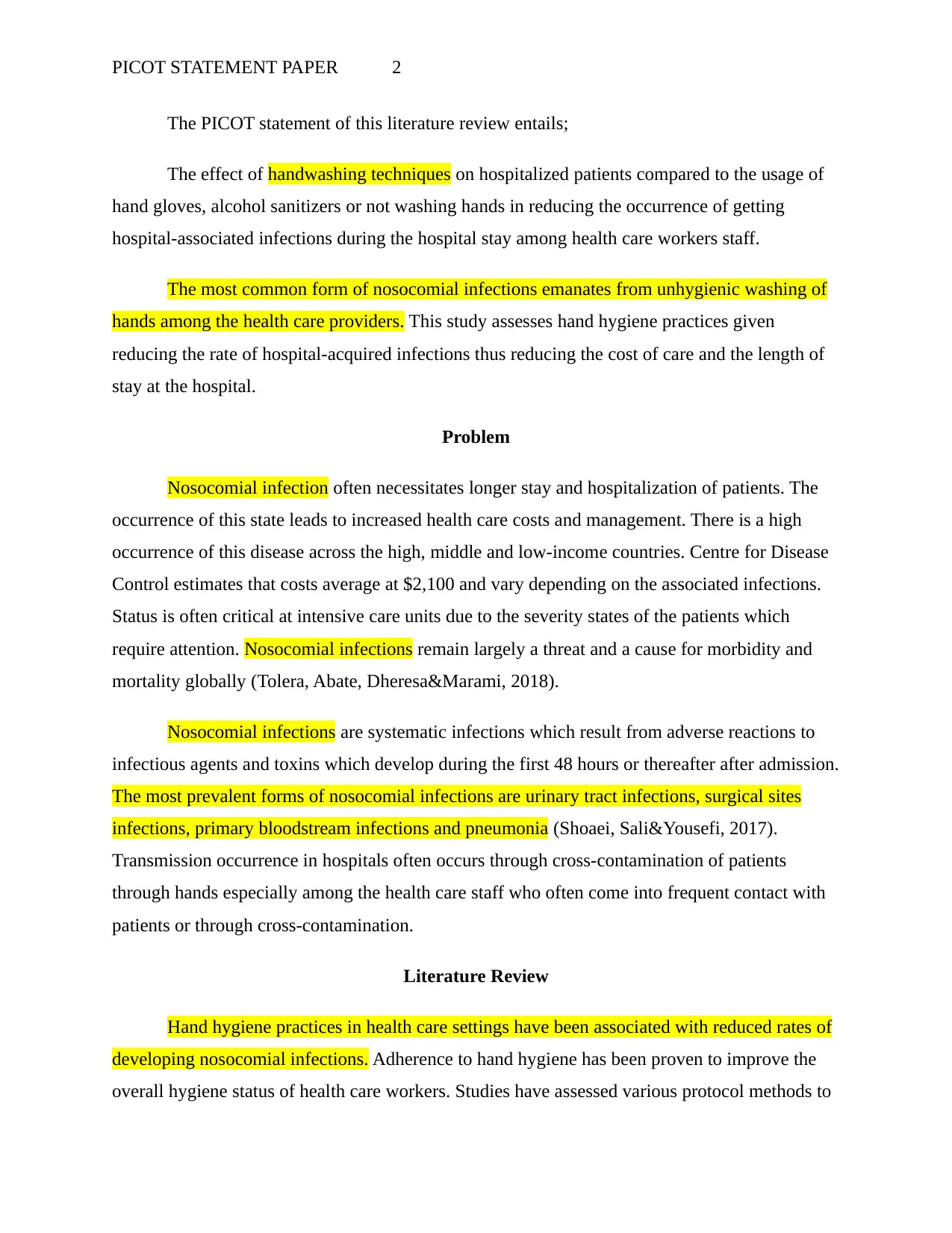
PICOT STATEMENT PAPER 2
The PICOT statement of this literature review entails;
The effect of handwashing techniques on hospitalized patients compared to the usage of
hand gloves, alcohol sanitizers or not washing hands in reducing the occurrence of getting
hospital-associated infections during the hospital stay among health care workers staff.
The most common form of nosocomial infections emanates from unhygienic washing of
hands among the health care providers. This study assesses hand hygiene practices given
reducing the rate of hospital-acquired infections thus reducing the cost of care and the length of
stay at the hospital.
Problem
Nosocomial infection often necessitates longer stay and hospitalization of patients. The
occurrence of this state leads to increased health care costs and management. There is a high
occurrence of this disease across the high, middle and low-income countries. Centre for Disease
Control estimates that costs average at $2,100 and vary depending on the associated infections.
Status is often critical at intensive care units due to the severity states of the patients which
require attention. Nosocomial infections remain largely a threat and a cause for morbidity and
mortality globally (Tolera, Abate, Dheresa&Marami, 2018).
Nosocomial infections are systematic infections which result from adverse reactions to
infectious agents and toxins which develop during the first 48 hours or thereafter after admission.
The most prevalent forms of nosocomial infections are urinary tract infections, surgical sites
infections, primary bloodstream infections and pneumonia (Shoaei, Sali&Yousefi, 2017).
Transmission occurrence in hospitals often occurs through cross-contamination of patients
through hands especially among the health care staff who often come into frequent contact with
patients or through cross-contamination.
Literature Review
Hand hygiene practices in health care settings have been associated with reduced rates of
developing nosocomial infections. Adherence to hand hygiene has been proven to improve the
overall hygiene status of health care workers. Studies have assessed various protocol methods to
The PICOT statement of this literature review entails;
The effect of handwashing techniques on hospitalized patients compared to the usage of
hand gloves, alcohol sanitizers or not washing hands in reducing the occurrence of getting
hospital-associated infections during the hospital stay among health care workers staff.
The most common form of nosocomial infections emanates from unhygienic washing of
hands among the health care providers. This study assesses hand hygiene practices given
reducing the rate of hospital-acquired infections thus reducing the cost of care and the length of
stay at the hospital.
Problem
Nosocomial infection often necessitates longer stay and hospitalization of patients. The
occurrence of this state leads to increased health care costs and management. There is a high
occurrence of this disease across the high, middle and low-income countries. Centre for Disease
Control estimates that costs average at $2,100 and vary depending on the associated infections.
Status is often critical at intensive care units due to the severity states of the patients which
require attention. Nosocomial infections remain largely a threat and a cause for morbidity and
mortality globally (Tolera, Abate, Dheresa&Marami, 2018).
Nosocomial infections are systematic infections which result from adverse reactions to
infectious agents and toxins which develop during the first 48 hours or thereafter after admission.
The most prevalent forms of nosocomial infections are urinary tract infections, surgical sites
infections, primary bloodstream infections and pneumonia (Shoaei, Sali&Yousefi, 2017).
Transmission occurrence in hospitals often occurs through cross-contamination of patients
through hands especially among the health care staff who often come into frequent contact with
patients or through cross-contamination.
Literature Review
Hand hygiene practices in health care settings have been associated with reduced rates of
developing nosocomial infections. Adherence to hand hygiene has been proven to improve the
overall hygiene status of health care workers. Studies have assessed various protocol methods to
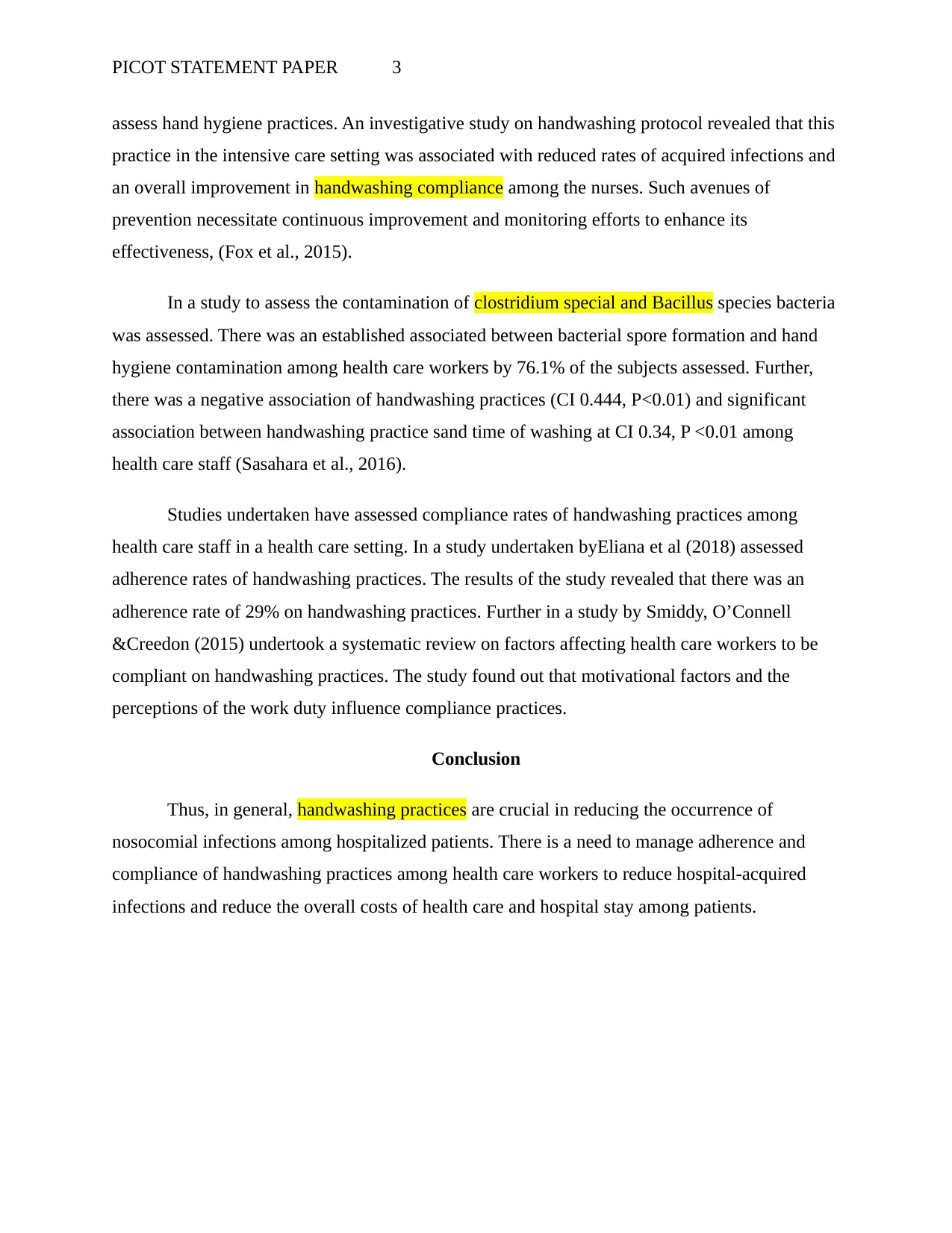
PICOT STATEMENT PAPER 3
assess hand hygiene practices. An investigative study on handwashing protocol revealed that this
practice in the intensive care setting was associated with reduced rates of acquired infections and
an overall improvement in handwashing compliance among the nurses. Such avenues of
prevention necessitate continuous improvement and monitoring efforts to enhance its
effectiveness, (Fox et al., 2015).
In a study to assess the contamination of clostridium special and Bacillus species bacteria
was assessed. There was an established associated between bacterial spore formation and hand
hygiene contamination among health care workers by 76.1% of the subjects assessed. Further,
there was a negative association of handwashing practices (CI 0.444, P<0.01) and significant
association between handwashing practice sand time of washing at CI 0.34, P <0.01 among
health care staff (Sasahara et al., 2016).
Studies undertaken have assessed compliance rates of handwashing practices among
health care staff in a health care setting. In a study undertaken byEliana et al (2018) assessed
adherence rates of handwashing practices. The results of the study revealed that there was an
adherence rate of 29% on handwashing practices. Further in a study by Smiddy, O’Connell
&Creedon (2015) undertook a systematic review on factors affecting health care workers to be
compliant on handwashing practices. The study found out that motivational factors and the
perceptions of the work duty influence compliance practices.
Conclusion
Thus, in general, handwashing practices are crucial in reducing the occurrence of
nosocomial infections among hospitalized patients. There is a need to manage adherence and
compliance of handwashing practices among health care workers to reduce hospital-acquired
infections and reduce the overall costs of health care and hospital stay among patients.
assess hand hygiene practices. An investigative study on handwashing protocol revealed that this
practice in the intensive care setting was associated with reduced rates of acquired infections and
an overall improvement in handwashing compliance among the nurses. Such avenues of
prevention necessitate continuous improvement and monitoring efforts to enhance its
effectiveness, (Fox et al., 2015).
In a study to assess the contamination of clostridium special and Bacillus species bacteria
was assessed. There was an established associated between bacterial spore formation and hand
hygiene contamination among health care workers by 76.1% of the subjects assessed. Further,
there was a negative association of handwashing practices (CI 0.444, P<0.01) and significant
association between handwashing practice sand time of washing at CI 0.34, P <0.01 among
health care staff (Sasahara et al., 2016).
Studies undertaken have assessed compliance rates of handwashing practices among
health care staff in a health care setting. In a study undertaken byEliana et al (2018) assessed
adherence rates of handwashing practices. The results of the study revealed that there was an
adherence rate of 29% on handwashing practices. Further in a study by Smiddy, O’Connell
&Creedon (2015) undertook a systematic review on factors affecting health care workers to be
compliant on handwashing practices. The study found out that motivational factors and the
perceptions of the work duty influence compliance practices.
Conclusion
Thus, in general, handwashing practices are crucial in reducing the occurrence of
nosocomial infections among hospitalized patients. There is a need to manage adherence and
compliance of handwashing practices among health care workers to reduce hospital-acquired
infections and reduce the overall costs of health care and hospital stay among patients.
⊘ This is a preview!⊘
Do you want full access?
Subscribe today to unlock all pages.

Trusted by 1+ million students worldwide
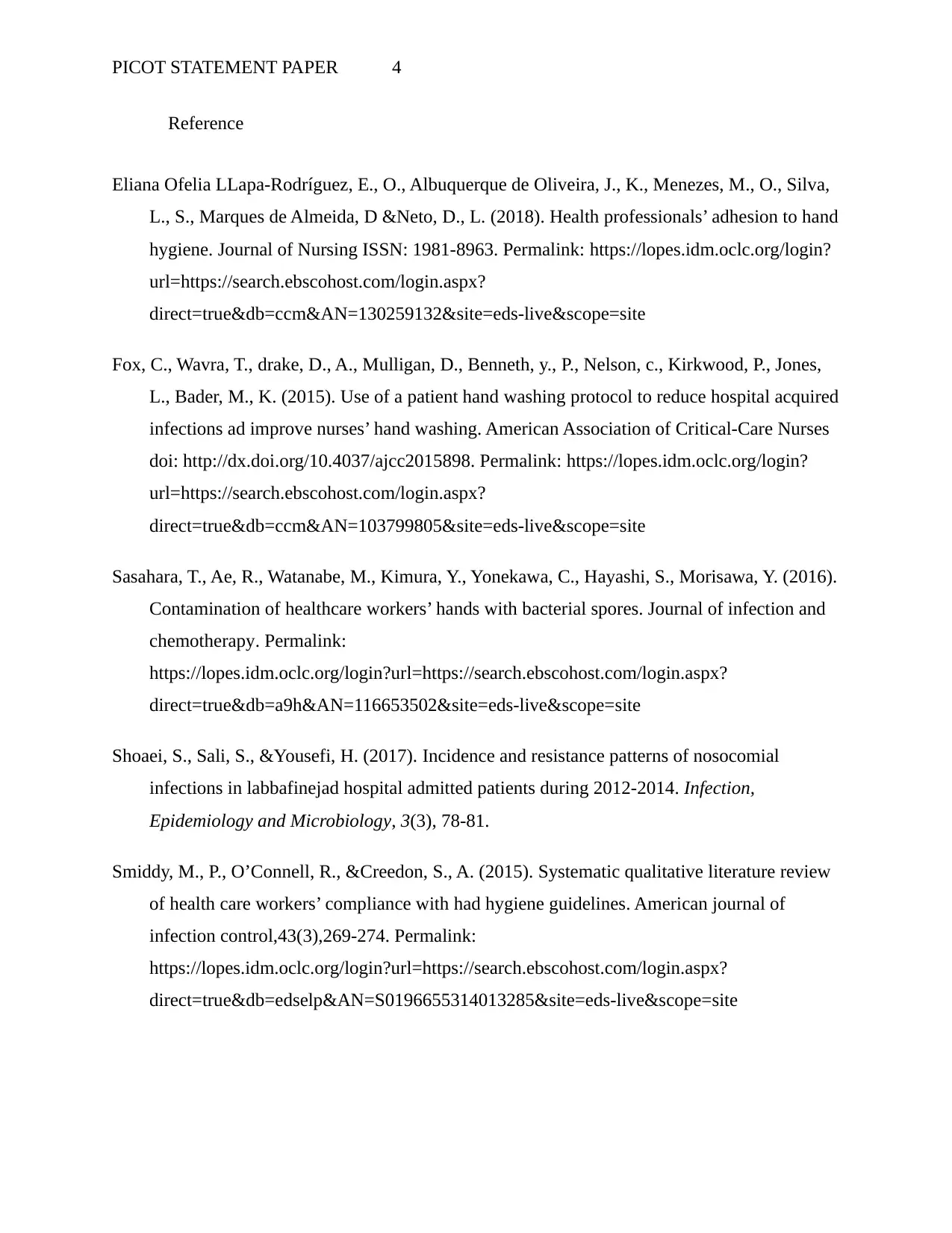
PICOT STATEMENT PAPER 4
Reference
Eliana Ofelia LLapa-Rodríguez, E., O., Albuquerque de Oliveira, J., K., Menezes, M., O., Silva,
L., S., Marques de Almeida, D &Neto, D., L. (2018). Health professionals’ adhesion to hand
hygiene. Journal of Nursing ISSN: 1981-8963. Permalink: https://lopes.idm.oclc.org/login?
url=https://search.ebscohost.com/login.aspx?
direct=true&db=ccm&AN=130259132&site=eds-live&scope=site
Fox, C., Wavra, T., drake, D., A., Mulligan, D., Benneth, y., P., Nelson, c., Kirkwood, P., Jones,
L., Bader, M., K. (2015). Use of a patient hand washing protocol to reduce hospital acquired
infections ad improve nurses’ hand washing. American Association of Critical-Care Nurses
doi: http://dx.doi.org/10.4037/ajcc2015898. Permalink: https://lopes.idm.oclc.org/login?
url=https://search.ebscohost.com/login.aspx?
direct=true&db=ccm&AN=103799805&site=eds-live&scope=site
Sasahara, T., Ae, R., Watanabe, M., Kimura, Y., Yonekawa, C., Hayashi, S., Morisawa, Y. (2016).
Contamination of healthcare workers’ hands with bacterial spores. Journal of infection and
chemotherapy. Permalink:
https://lopes.idm.oclc.org/login?url=https://search.ebscohost.com/login.aspx?
direct=true&db=a9h&AN=116653502&site=eds-live&scope=site
Shoaei, S., Sali, S., &Yousefi, H. (2017). Incidence and resistance patterns of nosocomial
infections in labbafinejad hospital admitted patients during 2012-2014. Infection,
Epidemiology and Microbiology, 3(3), 78-81.
Smiddy, M., P., O’Connell, R., &Creedon, S., A. (2015). Systematic qualitative literature review
of health care workers’ compliance with had hygiene guidelines. American journal of
infection control,43(3),269-274. Permalink:
https://lopes.idm.oclc.org/login?url=https://search.ebscohost.com/login.aspx?
direct=true&db=edselp&AN=S0196655314013285&site=eds-live&scope=site
Reference
Eliana Ofelia LLapa-Rodríguez, E., O., Albuquerque de Oliveira, J., K., Menezes, M., O., Silva,
L., S., Marques de Almeida, D &Neto, D., L. (2018). Health professionals’ adhesion to hand
hygiene. Journal of Nursing ISSN: 1981-8963. Permalink: https://lopes.idm.oclc.org/login?
url=https://search.ebscohost.com/login.aspx?
direct=true&db=ccm&AN=130259132&site=eds-live&scope=site
Fox, C., Wavra, T., drake, D., A., Mulligan, D., Benneth, y., P., Nelson, c., Kirkwood, P., Jones,
L., Bader, M., K. (2015). Use of a patient hand washing protocol to reduce hospital acquired
infections ad improve nurses’ hand washing. American Association of Critical-Care Nurses
doi: http://dx.doi.org/10.4037/ajcc2015898. Permalink: https://lopes.idm.oclc.org/login?
url=https://search.ebscohost.com/login.aspx?
direct=true&db=ccm&AN=103799805&site=eds-live&scope=site
Sasahara, T., Ae, R., Watanabe, M., Kimura, Y., Yonekawa, C., Hayashi, S., Morisawa, Y. (2016).
Contamination of healthcare workers’ hands with bacterial spores. Journal of infection and
chemotherapy. Permalink:
https://lopes.idm.oclc.org/login?url=https://search.ebscohost.com/login.aspx?
direct=true&db=a9h&AN=116653502&site=eds-live&scope=site
Shoaei, S., Sali, S., &Yousefi, H. (2017). Incidence and resistance patterns of nosocomial
infections in labbafinejad hospital admitted patients during 2012-2014. Infection,
Epidemiology and Microbiology, 3(3), 78-81.
Smiddy, M., P., O’Connell, R., &Creedon, S., A. (2015). Systematic qualitative literature review
of health care workers’ compliance with had hygiene guidelines. American journal of
infection control,43(3),269-274. Permalink:
https://lopes.idm.oclc.org/login?url=https://search.ebscohost.com/login.aspx?
direct=true&db=edselp&AN=S0196655314013285&site=eds-live&scope=site
Paraphrase This Document
Need a fresh take? Get an instant paraphrase of this document with our AI Paraphraser
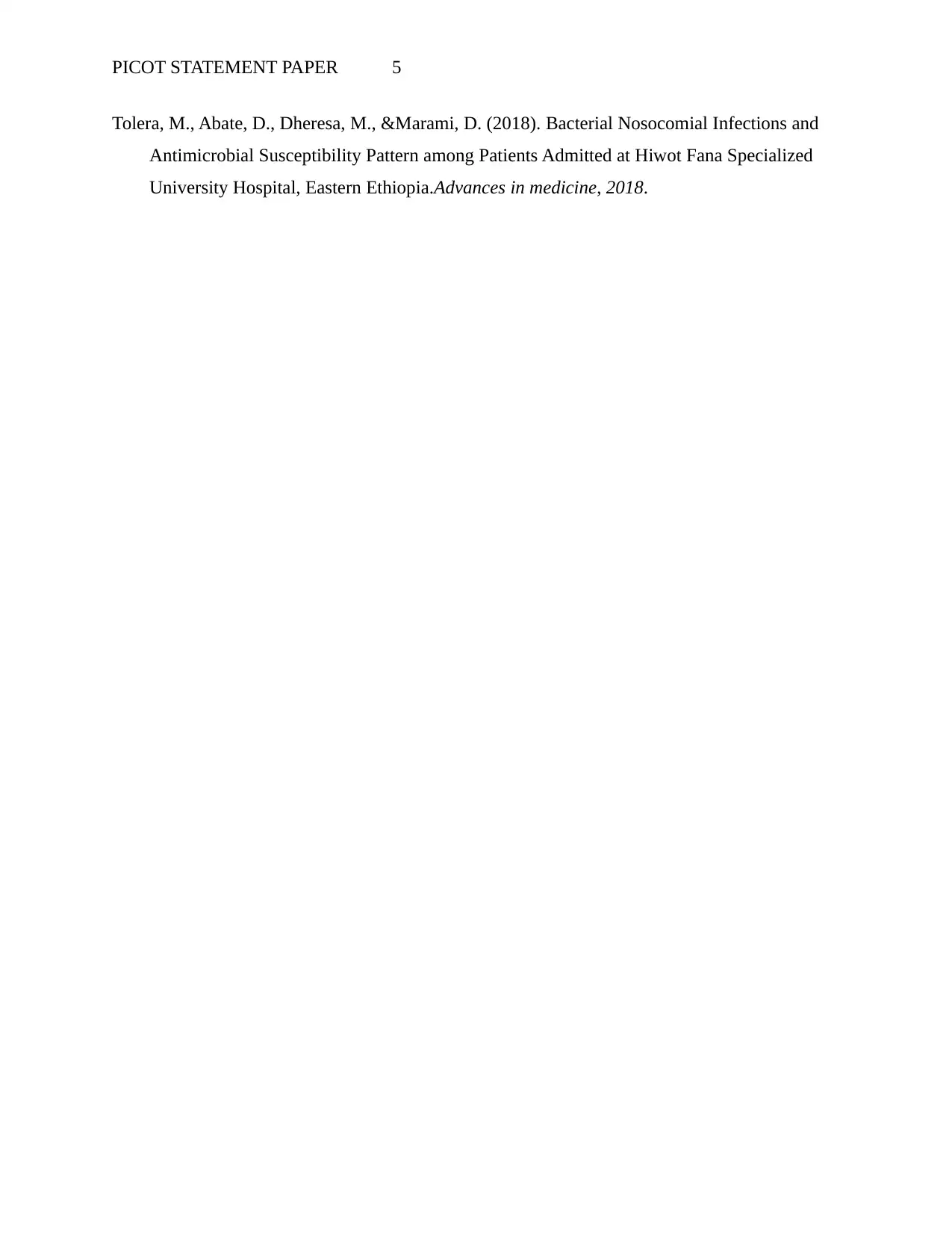
PICOT STATEMENT PAPER 5
Tolera, M., Abate, D., Dheresa, M., &Marami, D. (2018). Bacterial Nosocomial Infections and
Antimicrobial Susceptibility Pattern among Patients Admitted at Hiwot Fana Specialized
University Hospital, Eastern Ethiopia.Advances in medicine, 2018.
Tolera, M., Abate, D., Dheresa, M., &Marami, D. (2018). Bacterial Nosocomial Infections and
Antimicrobial Susceptibility Pattern among Patients Admitted at Hiwot Fana Specialized
University Hospital, Eastern Ethiopia.Advances in medicine, 2018.
1 out of 5
Related Documents
Your All-in-One AI-Powered Toolkit for Academic Success.
+13062052269
info@desklib.com
Available 24*7 on WhatsApp / Email
![[object Object]](/_next/static/media/star-bottom.7253800d.svg)
Unlock your academic potential
Copyright © 2020–2026 A2Z Services. All Rights Reserved. Developed and managed by ZUCOL.





